(Note: If you haven’t read it yet, my introductory post on this Star Trek: The Original Series rewatch is a good place to start.)
Original Air Date: January 17, 1969
Crew Death Count: 0
Bellybuttons: 0
“The Mark of Gideon” works better as allegory than as a conventional science-fiction story; it’s better suited to a stage production, like “The Empath.” TOS aired at a time when this approach was more acceptable, before nerds turned every science fiction or fantasy production into an obsessive exercise of nitpicking over canon and continuity. So thanks, nerds, for giving us a world where the Marvel Crapmatic Universe is considered art. Having said that, the story – co-written by Stanley Adams, who portrayed Cyrano Jones in “The Trouble with Tribbles” – could have used more work because even as allegory, “The Mark of Gideon” has some significant logical shortcomings. It does, however, provide an important message on the dangers of extremism that remains sadly relevant today.
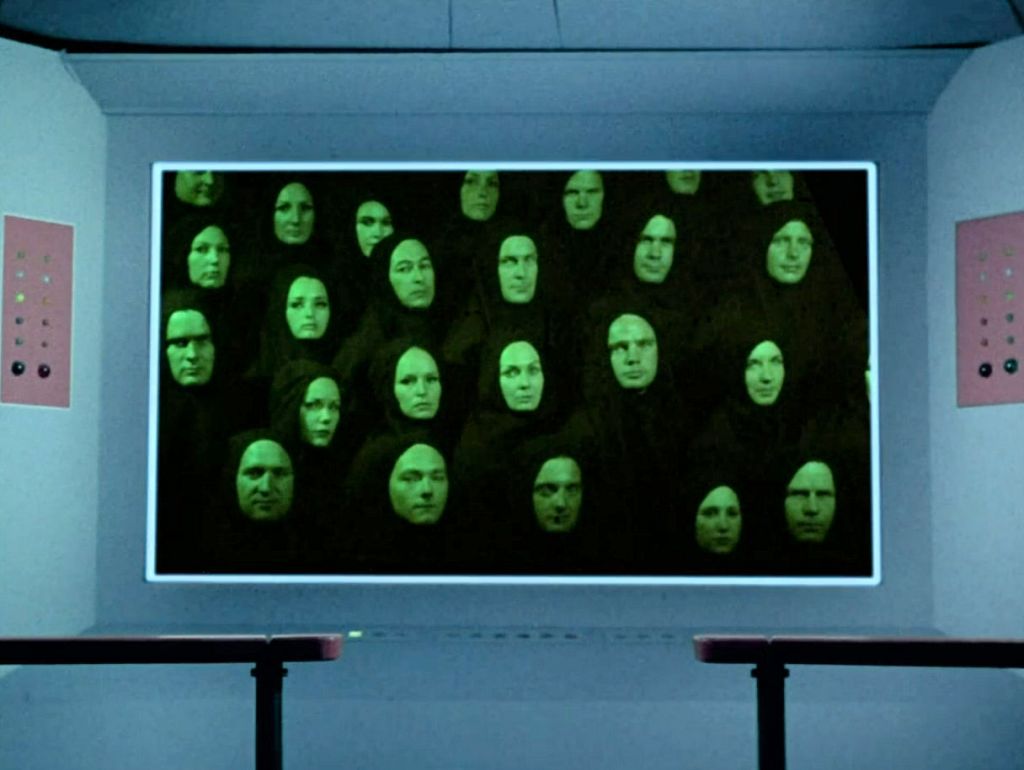
This week, the Enterprise travels to the planet Gideon, which is engaged in negotiations to join the Federation. Gideon’s highly secretive leaders, however, will only allow an initial delegation of one, insisting that it be Kirk. Upon beaming down, Kirk finds himself in a duplicate of the Enterprise, otherwise empty until Odona (Sharon Acker) shows up, claiming to have little memory of where she’s from or why she’s here. Gradually we learn that Gideon is drastically overcrowded due to virtually no illness – including a planet-wide absence of pathogenic microorganisms – and a fanatical avoidance of birth control or abstinence. The Gideons have stealthily obtained a sample of Kirk’s blood, which carries remnants from a prior infection of deadly Vegan choriomeningitis, a disease that Kirk calls “very rare and always fatal if not treated within twenty-four hours.” Fatal is what the Gideons want – they administer Kirk’s blood sample to Odona, intending her to die, creating a new life cycle for Gideons and, ultimately, relief from overpopulation.
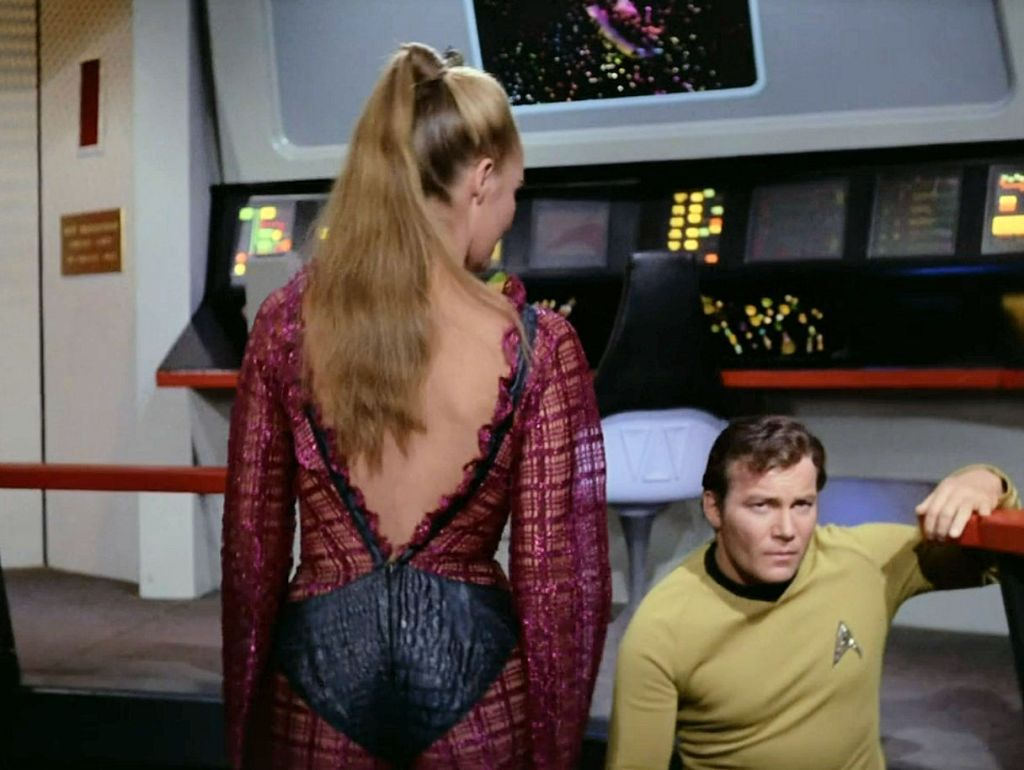
There are fascinating issues here regarding extremism, public health, and overpopulation, but, as noted, the episode doesn’t live up to its potential. First and foremost, why is the Federation interested in Gideon at all? Gideon has provided false reports to the Federation, describing their own planet rave reviews and omitting anything about overcrowding. “According to the physiocultural reports submitted to the Federation,” Kirk says, “it’s a virtual paradise.” We know by now that any mention of paradise is a danger sign. Yet there’s no discussion of Gideon possessing scarce resources or a strategic location. Gideon’s secrecy alone should raise eyebrows; the planet is even shielded from sensor scans. Gideon is almost exclusively represented by Ambassador Hodin (David Hurst), who describes “our jealous tradition of isolation from all contaminating contacts with the violent nature of planets of other star systems,” making us wonder why Gideon even needs an ambassador. And we know from experience that when Kirk is asked to arrive alone, trouble is afoot. (See “What Are Little Girls Made Of?” and “Dagger of the Mind.”) The Federation can’t expect much in the way of a treaty if Gideon only permits one representative at a time.
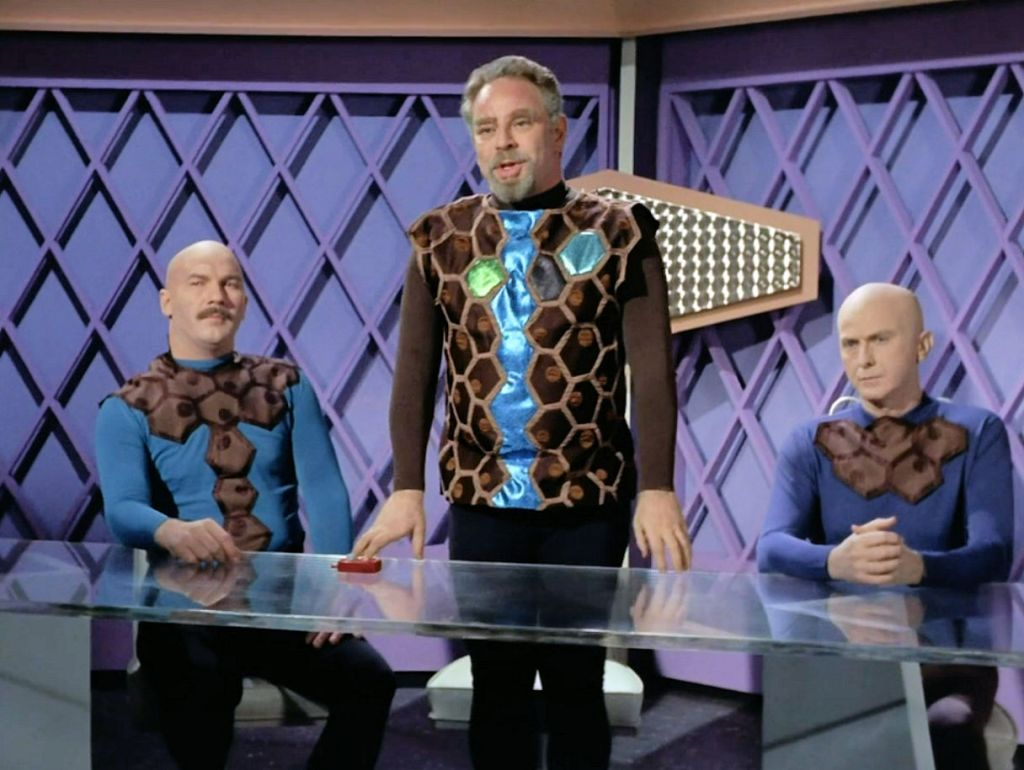
A further distraction from the episode’s potential is the Enterprise crew’s extraordinary ineptitude. When Kirk believes he is transporting to the Gideon council chamber, he goes without a communicator. Is it possible the Gideons took it during the brief time he was unconscious, while they collected Kirk’s blood sample? We get no hint of that, but it would have been a far better writing choice than simply pretending Kirk forgot such an essential device. Spock is slow to figure out that Hodin is up to something, despite the ambassador’s suspicious behavior from the start. Spock is also downright bitter toward diplomats and diplomacy in general; given Spock’s rocky relationship with his father, also an ambassador, it’s understandable Spock would have a chip on his shoulder toward the profession. But this is excessive to the point of whining. “The purpose of diplomacy is to prolong a crisis,” Spock says. Then, later, “Diplomats and bureaucrats may function differently, but they achieve exactly the same results.” These are illogical statements for a pacifist. They sound like dialogue originally written for McCoy and handed off to Spock to keep our attention on him. The rest of the bridge crew gets little to do besides express outrage at Hodin’s obfuscations. The Federation doesn’t fare much better, repeatedly passing the buck when the Enterprise seeks guidance. The admiral who refuses Spock’s reasonable request to conduct a first-hand search on Gideon demonstrates no concern over a missing captain, asking, “Do you have evidence the captain’s life is threatened?” Well, he has disappeared, so that might be something of a red flag. The admiral’s primary concern is not provoking a war with Gideon, which is quite a leap given no evidence that Gideon has offensive capabilities or even their own starships. The crew’s biggest failing, of course, is the coordinates mix-up that sends Kirk to the wrong place originally. It’s information that could have been independently verified multiple times in the episode, for example when the Gideon representative briefly beams up to the ship before being promptly returned.

The Gideons themselves, like so many aliens, look identical to humans. It’s never clear how they are able to construct a duplicate Enterprise, right down to interior furnishings and decorations. They appear to have no interstellar travel capabilities of their own, though Odona is quick to grasp the concept of a starship. The Gideons’ purpose is clear enough, to give Kirk a familiar environment where, they hope, he will fall in love with Odona and decide to stay on Gideon. Odona urges the captain to “Be content.” It nearly works; Kirk is frighteningly distracted by Odona, sharing a tryst in his quarters, before he comes to his senses and resumes his search. Failing that, the Gideons intend to keep Kirk against his will, requiring his blood for continued Vegan choriomeningitis infections. Despite the admiral’s apathy, it’s hard to imagine the Federation would abandon Kirk entirely, or why the Gideons would expect them to. Their planet is so crowded that, according to Hodin, “Gideon is encased in a living mass who can find no rest, no peace, no joy.” The few images we get of average Gideons demonstrate that they truly are packed together like sardines, endlessly jostling for room to breathe. Odona describes the entire planet as looking like this, with a complete breakdown of privacy and quality of life. “I was struggling for oxygen,” she says, “screaming to get out.”
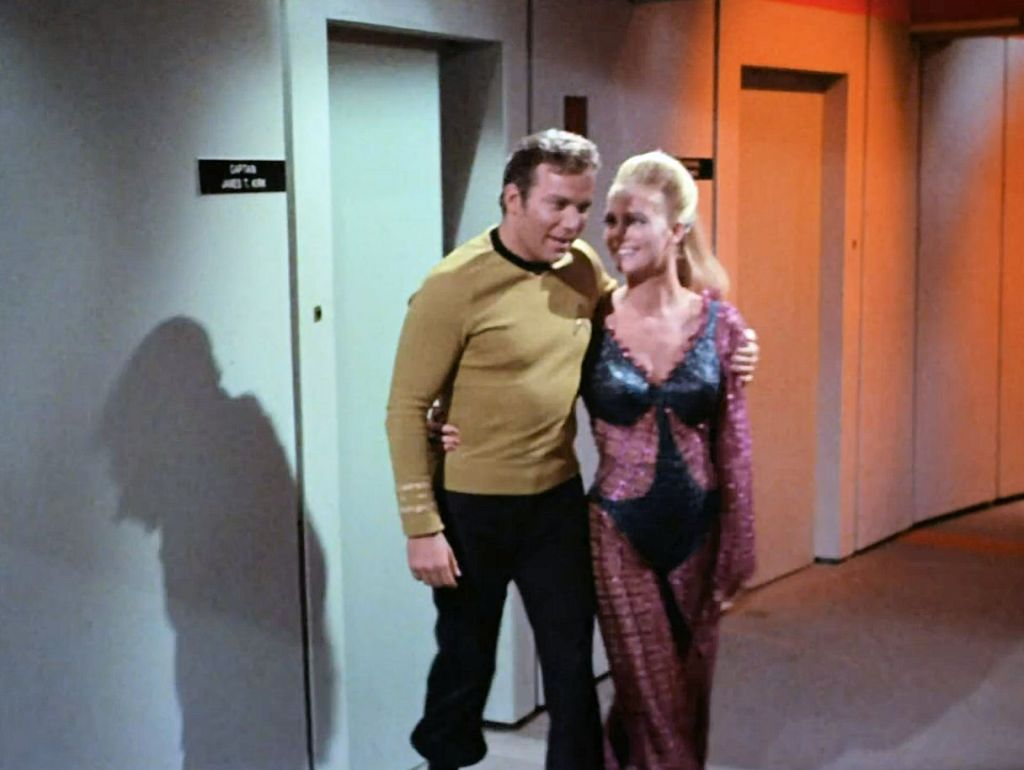
This is where the episode works best as allegory rather than literal interpretation. Nitpickers will question how the Gideons could find room for a duplicate Enterprise if space is at such a premium. And the logical among us will question – as Kirk does – why the Gideons don’t just practice birth control or conduct a few vasectomies. This is the entire point of the episode, and the primary lesson we can take from it. Yes, there is a touch of anti-urban rhetoric; America’s urban white flight, leaving a cultural and economic wasteland in the cores of cities across the country, was nearly complete by 1969. But pro-life fraud is the real villain here. Hodin’s explanation to Kirk sounds eerily similar to religious fundamentalists of our own time: “The people of Gideon have always believed that life is sacred, that the love of life is the greatest gift. That is the one unshakable truth of Gideon, and this overwhelming love of life has developed our regenerative capacity and our great longevity.” Kirk’s response: “And the great misery which you now face.” This exposes the hypocrisy of the entire “life is sacred” mantra of the faux “pro-life” movement, both on Gideon and earth. Odona, also, gives us a hint of the Gideons’ phoniness; as Kirk insists on searching for his crew, who he initially presumes to be missing, she says, “I envy you your sense of loyalty.” We can imagine loyalty is sorely lacking on “pro-life” Gideon, where every square foot involves a struggle for survival. This is typical of extremists, who publicly proclaim unity but are ready to turn on one another at the slightest disagreement.
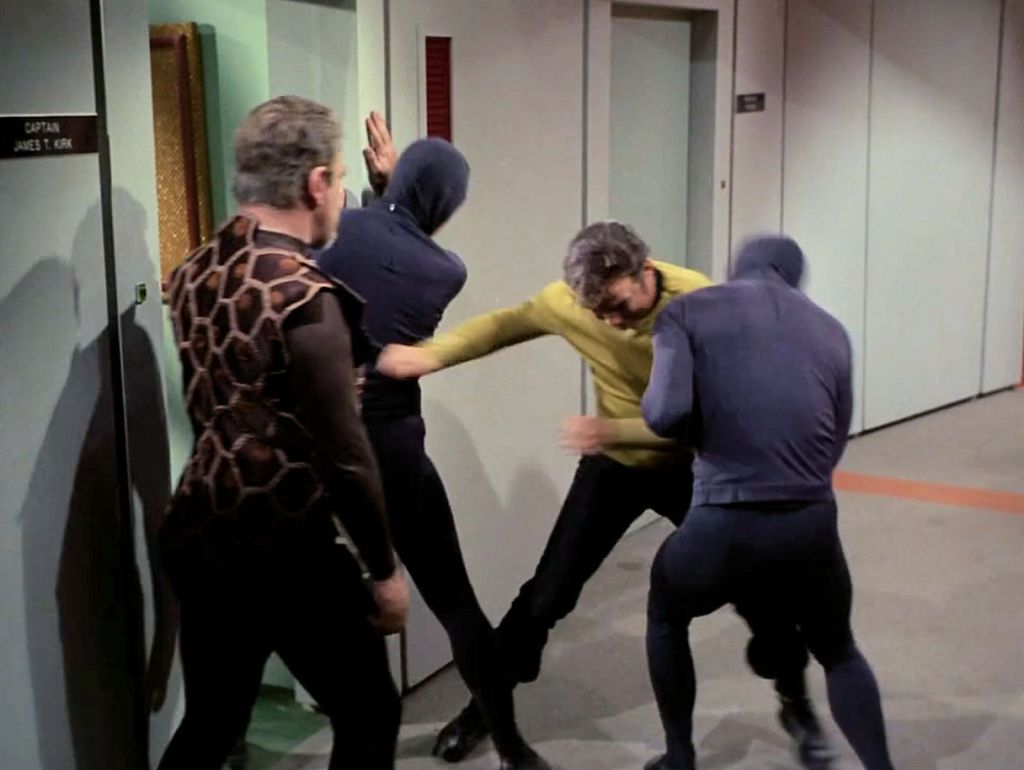
This easily qualifies Odona as the most courageous of her people. “No one commands Odona,” she says, proving that she volunteered for her mission. She alone is willing to sacrifice her life, a gesture that Hodin says will give hope to all of Gideon. It’s unlikely Odona would be an acceptable role model to our own brand of extremists, who fear change as rabidly as they fear intelligent debate. “The Mark of Gideon” shows us the inevitable outcome – less vivid in real life, but equally destructive – in a land burdened by anti-science extremism. Today we face life-threatening restrictions to women’s healthcare, panic over stem cell research with the potential to prevent diseases that cause widespread suffering and death, and restricted access to birth control in an obsessive desire to create life without caring for it. Just like the Gideons, our own culture consistently ruins the one thing it claims to hold sacred.
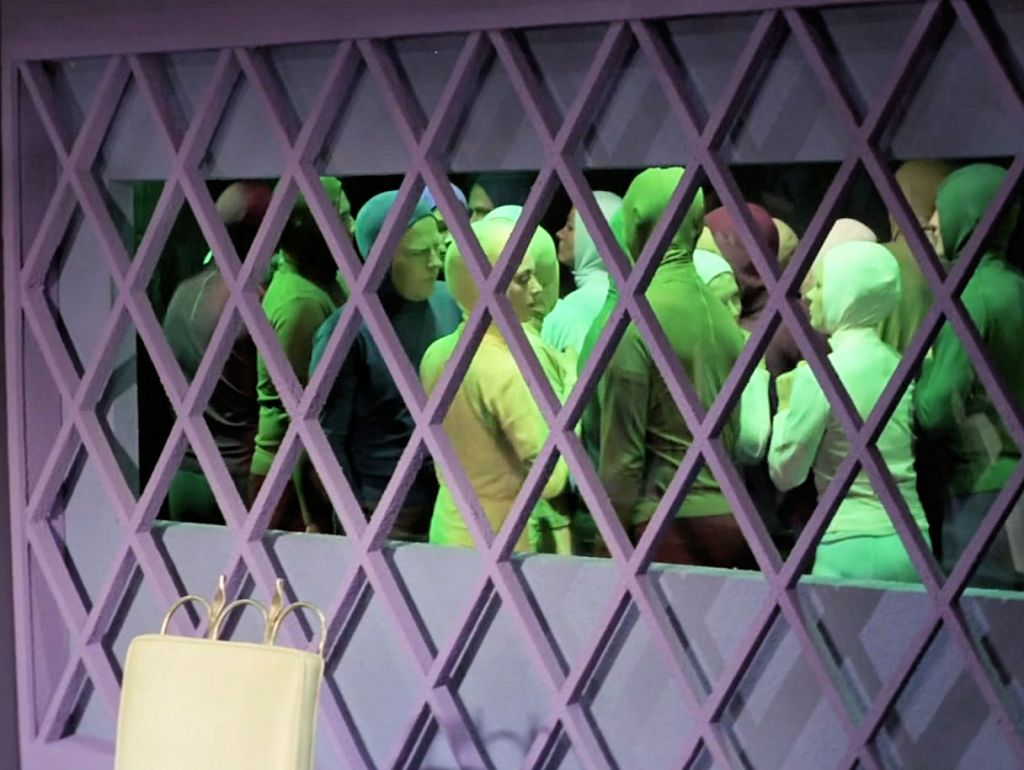
The anti-life reality of pro-life ideology is somewhat a political strategy: keep the masses feuding while the oligarchy remains powerful. Other times, it is a consequence of magical thinking. Gideon of the Old Testament was sent by God to lead an army against Midianites who had laid siege to Israel. Gideon first challenged God to prove his identity; to teach Gideon a lesson, God forced Gideon to act out of faith. The name is derived from a Hebrew verb to hew down or cut off, and so Gideon’s army of thousands is reduced to a few hundred. With nothing left but faith, they rely on calamitous noise – including trumpets – to intimidate the Midianites into self-destruction. The people of “The Mark of Gideon” rely on faith and turn their paradise of a planet into a living hell. They rely on faith a second time, trusting Kirk to introduce disease to their planet rather than face up to their backward ways. In fact, if anyone here should have faith, it’s Kirk. He’s the one who can rely on loyal colleagues, a quality we know the Gideons lack.
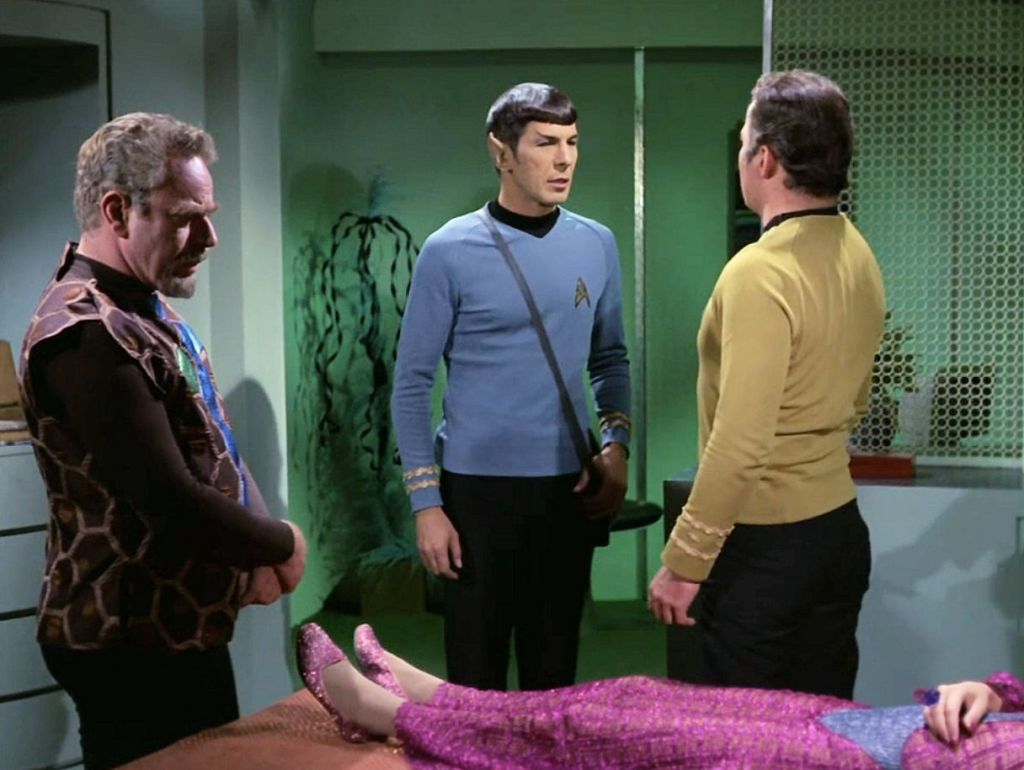
The entire situation is a neat twist on the Prime Directive: the Federation strives to avoid interference, but what if they are tricked into literally infecting another culture? Undoing the infection is impossible, so Kirk performs what damage control he can: he does save the Gideons, but only by working in mysterious ways and denying the Gideons’ defeatist path. Spock deciphers the captain’s location just in time, and is smart enough to show up with a communicator. They take Odona to the real Enterprise sickbay where McCoy works his magic and saves her. Now Odona can provide the Vegan choriomeningitis to hew down Gideon’s population. Earlier in the episode, while Kirk and Odona savor their solitude on the duplicate Enterprise, Odona admires the viewscreen’s display of outer space and says, “So quiet, so peaceful.” Kirk responds, “It isn’t really, you know.” It’s an indirect way of saying “Be careful what you wish for.” Kirk may be tempted by leisurely love with Odona, but he soon realizes the Enterprise – the real Enterprise, with his crew – is where he needs to be. Odona may find solace in the empty corridors and hope for the experience to last forever, but she ultimately understands her place is with her people, leading them into the brave new future. “That is what I must do,” she says. The episode’s pro-death message may be frustrating for those of us eager to extend human lifespans, but “The Mark of Gideon” is an effective reminder that faith alone will not save us. Our actions are what matter, and it is up to us to save ourselves.
Next: That Which Survives